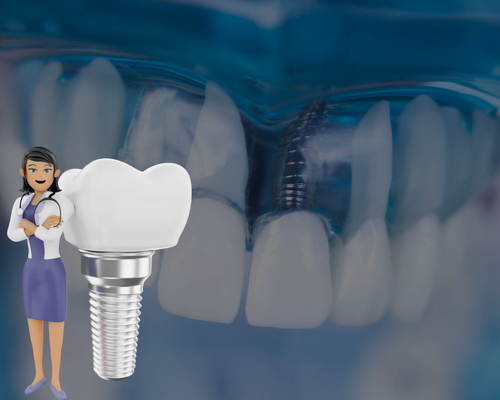Dental implants are a remarkable solution for replacing missing teeth, but when it comes to wisdom teeth, they have a different role. Wisdom teeth, also known as third molars, are often removed due to issues like crowding, impaction, or discomfort. Unlike the other teeth in your mouth, they are typically not used for chewing, so they don’t play a significant role in your bite.
Using dental implants to replace wisdom teeth is uncommon and generally not recommended. Dental implants are typically reserved for replacing functional teeth in your smile. Wisdom teeth are usually removed because they don’t serve a critical purpose, and their removal is a more common and straightforward procedure.
What are Wisdom Teeth ?
 Wisdom teeth, also known as third molars, are the last set of molars located at the back of your mouth. They typically start to emerge in your late teens or early twenties. Most people have four wisdom teeth, one in each corner of the mouth, but some may have fewer or even none.
Wisdom teeth, also known as third molars, are the last set of molars located at the back of your mouth. They typically start to emerge in your late teens or early twenties. Most people have four wisdom teeth, one in each corner of the mouth, but some may have fewer or even none.
These teeth are called “wisdom teeth” because they come in at a more mature age when a person is considered to be wiser. However, they often cause dental issues due to their late arrival and lack of space in the mouth. As a result, they may need to be removed through a dental procedure to prevent problems like impaction, crowding, or infection.
Can you Implant a Wisdom Tooth to Replace a Missing Tooth?
No, you can’t implant a wisdom tooth to replace a missing tooth. Wisdom teeth are typically removed, and they aren’t suitable for tooth replacement because they’re at the back of the mouth and don’t serve the same function as other teeth. To replace a missing tooth, dentists typically use dental implants, bridges, or dentures. It’s important to consult with a dentist for the best treatment option.
Connection Between Dental Implants, Wisdom Tooth, and Missing Tooth
The relationship between dental implants, wisdom teeth, and missing teeth lies in their roles and functions within the context of oral health:
- Dental Implants and Missing Teeth: Dental implants are directly related to the replacement of missing teeth. When a natural tooth is lost due to various reasons such as decay, injury, or disease, a dental implant can be used as a substitute. The implant serves as an artificial root anchored in the jawbone, providing a strong foundation for attaching a prosthetic tooth. This helps restore the function and appearance of the missing tooth, improving chewing ability and aesthetics.

- Wisdom Teeth and Missing Teeth: Wisdom teeth, also known as third molars, may be indirectly related to missing teeth in specific situations. These teeth typically emerge later in life and can cause problems due to their late arrival and limited space in the mouth. If a wisdom tooth pushes against an adjacent molar or causes crowding, it might lead to damage or the need for the removal of the second molar. In such cases, if the second molar is removed, it could potentially be replaced with a dental implant or other dental treatments to restore proper function.
- Dental Implants and Wisdom Teeth: Dental implants are not typically used to replace wisdom teeth. Wisdom teeth are usually removed because they often don’t serve a functional purpose and can lead to oral health issues. Dental implants are more commonly employed to replace missing teeth that are critical for chewing and aesthetics, rather than wisdom teeth.
In essence, dental implants are primarily used to replace missing functional teeth, while wisdom teeth are generally unrelated to dental implant treatment. Wisdom teeth are commonly removed to prevent complications, and if they cause issues with adjacent teeth, dental treatments like implants may be considered to restore proper oral function.
Replacing Missing Teeth
Replacing missing teeth is an important aspect of maintaining oral health and restoring your smile’s function and appearance. There are several options to replace missing teeth, depending on your specific situation and preferences. Here are some common methods:
- Dental Implants: Dental implants are considered the gold standard for replacing missing teeth. They involve surgically placing a titanium post into the jawbone, which acts as an artificial tooth root. After the implant has fused with the bone, a custom-made crown is attached to the post. Dental implants are durable, natural-looking, and function like real teeth.
- Dental Bridges: Dental bridges are used to replace one or more adjacent missing teeth. They consist of artificial teeth (pontics) that are anchored to neighboring natural teeth or dental implants. Bridges are a non-removable solution, providing stability and functionality.
- Dentures: Dentures are removable appliances that can replace multiple missing teeth. Partial dentures are used when some natural teeth remain, while complete dentures are used when all teeth are missing. Modern dentures are more comfortable and natural-looking than in the past.
- Dental Crowns: Dental crowns are sometimes used to replace single missing teeth by capping the neighboring teeth. This approach is less common and is typically reserved for specific cases.
- Implant-Supported Dentures: These dentures are secured in place by dental implants, offering better stability and preventing issues like slippage or discomfort associated with traditional dentures.
- Resin-Bonded Bridge: Also known as a Maryland bridge, this option is used to replace a single missing front tooth. It involves bonding a false tooth to the adjacent natural teeth with metal or porcelain wings.
In Conclusion,
wisdom teeth aren’t good replacements for missing teeth, and they often cause problems, so they’re usually removed. When it comes to replacing missing teeth, you have dependable options like dentures, dental bridges, and dental implants, but wisdom teeth aren’t one of them.
For the best advice on teeth replacement, it’s smart to reach out to dental professionals. If you’re searching for best dental clinic in newtown to explore these replacement options and get expert dental care, make sure to choose reputable clinics with experienced staff. They’ll help you make the right choice for your oral health and give you effective treatments for replacing missing teeth.


